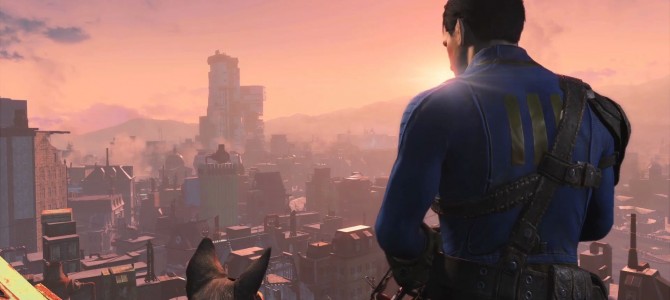
“Fallout 4” releases today, and you’ll have a hard time finding anyone more excited than I am. When Bethesda Studios’ Todd Howard announced the game’s release at this year’s E3, I could already tell that I was going to be calling in sick on November 10. If the reaction online was any indication, half of the First World will be MIA that day, as well.
Rightly so. People find themselves so engrossed in the Fallout series that it generates a pardonable obsession. But why? Is it the story, the gameplay, or the environment? It’s all of those, yes, but there’s an underlying factor that really gives people a love of the game. Years ago, I was given insight as to why.
In September 2008, Hurricane Ike hit my home in Galveston, Texas. The island was, for the most part, evacuated. Only a small bit of the citizenry remained behind, either due to figuring that they’d never get off the island due to heavy traffic, or having been disillusioned from Hurricane Rita’s failure to hit Galveston three years prior. Emergency personnel had remained behind, and among the police, firefighters, and paramedics was my dad, Officer Gordon Morse.
After the hurricane had passed, he called me and gave me a rundown on the aftermath. There was serious destruction, but our house had survived the storm, and I would need to return home to help clean it up. So I set out for the island to find my dad.
When Society Breaks to Bits
As I drove down the Seawall to Farm to Market Road 3005, the scene was something I’ve only seen before in movies. Buildings were rubble, a large chunk of the Hotel Galvez was missing, and some buildings that had been a part of Galveston for years were now gone, and the only clues they had been there were empty pylons in the water.
Later on, I would get out of my car and walk down the road on foot. Large portions of the asphalt were missing, and if a ditch wasn’t filled to the brim with water, it was filled to the brim with debris. Half of one house was shorn off. You could still see a bed and a bookshelf filled with old VHS tapes in it. The most singular part of it, though, was the silence. It’s an odd sensation to be surrounded by destruction and know that you’re alone.
There was no running water. Cleanup was done “whore’s bath” style. Any electricity had to come from a generator, or it didn’t come at all, as powerlines were down everywhere. You drank water out of a bottle, as drinking water anywhere else was dangerous. “You loot, we shoot” signs were not uncommon, and that was an honest threat.
It was a real post-apocalyptia. People had fled, or were dead or missing, and if they were there, they were there for a reason. It was an uncivilized land filled with people trying to bring civilization back. Law and order was primarily left up to the residents. They were to see to their own safety and property. If trouble did arise, you could call for police help, but it was best to just remember to squeeze the trigger, not pull.
It was a disaster area, and there was an odd freedom to it. There were almost no restrictions, but it wasn’t anarchy, either. It was, in a way, somewhat relaxing. I wasn’t the only one who thought that. The few of us there weren’t ever in a bad mood. If there was a problem, we were free to solve it how we wanted and, rest assured, it got solved. It’s a time I look back on very fondly.
‘Fallout 3’ Recreated This Doomsday Scenario
Little did I know that I’d be doing this all over again, only this time in DC. A month after Ike, the video game “Fallout 3” from Bethesda Studios released. It took players into a post-apocalyptic future within the Washington DC area. In it, a nuclear war had broken out, leveling most of the world to an irradiated wreck.
What buildings did survive were now shelters for those who managed to live through it all—or, in some cases, for unnatural beings. The area was sparsely populated, and those you ran into were either trying to enlist your help, sell you something, or kill you. Violent mutants roamed the land, raiders straight out of “Mad Max,” and a paramilitary, quasi-religious organization was trying to keep total collapse at bay. The U.S. government, now known as “The Enclave,” was attempting to pull this chaos back under its control through propaganda and, if need be, violence.
Amidst all of this, dotted around what had been dubbed the “Capital Wasteland,” were large underground habitats that those who were lucky enough to reach were kept safe from the nuclear fallout. Known as “Vaults,” these habitats provided every amenity needed for a comfortable survival until such a time when it was suitable to reemerge and rebuild—or so the inhabitants were told. They were clean, food was plentiful, and it was all well-ordered and maintained by “overseers”; for a while, at least.
Players find themselves in one of these Vaults at the beginning of the game. You’re awoken to learn that your father (played by Liam Neeson) had escaped from the Vault unauthorized, and they’d be coming for you. You’re tasked with escaping from the Vault yourself. After fighting your way to the giant, gear-shaped door, you exit a small cave-like antechamber and into the sun for the first time.
When the character’s eyes adjust, players see a desolated landscape. In the distance stand the ruins of DC. The Capital and the Washington Monument can be seen in a sea of half-destroyed buildings. Dead trees dot the landscape, and roads in various states of decay lead off into the distance. The vault door closed behind you when you left, and you now have the sense that you’re very alone, with all of this devastation around you.
Like when I first saw post-Ike Galveston, you’re thrilled. It’s the first taste of freedom you get after coming from a location with so many rules. Your safety and well-being are left up to you. How you survive is all up to your own wit and skill. In that knowledge, you set out to find your dad.
Freedom Is Risky, But Exhilarating
For many, this was their first introduction into the world of Fallout, and it was something of a pleasant shock. The player goes from a place of rules, norms, and structure, and suddenly put into a world where none of that exists. Instead of dread, the player feels somewhat elated, with a sense of uninhibited opportunity. You have a clear-cut mission, and to accomplish that mission you’re encouraged to do as you please.
The appeal of Fallout is a sense of not just being set at zero, but being able to take whatever direction you want to accomplish your ends. That’s what really grabs the people who delve into that post-apocalyptic world. It’s a sort of liberty that only comes when the boundaries that society erects are stripped away and you’re left to govern yourself.
No one is looking over your shoulder but you. You don’t have to care about anything but your personal needs. While you have to drink water out of a bottle, because the rest of it isn’t safe, and shooting on sight is sometimes your only option, there’s an attraction to it. It’s not safe, it’s not fair, but it is free, and people crave that independence.
In today’s society we’re given over to a stacking set of obligations that enclose us into confines of responsibility. We are forced to adhere to social rules, even if we think they’re ridiculous. We often jokingly think that if it all ended tomorrow, we’d be completely okay with that. In Fallout, it did end, and you have a blast in your virtually indulged morbid fantasy. In a world of technological comfort and the unimportant making headline news, it’s a liberating feeling to be put in a place where your only goal is to survive and rise.
Fallout’s rabid fanbase is more than ready to jump into that mindset once again, to scratch that underlying “what if” itch, and ditch a reality where one more rule is just a headline or signature away for one where the rules are what you make them. According to Howard, you’ll be able to do more than ever in this iteration of the series, and I, alongside thousands of others, can’t wait to dive headfirst into it.
“Fallout 4,” along with the world’s productivity, drops November 10.









